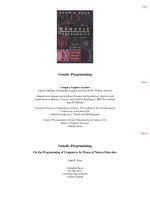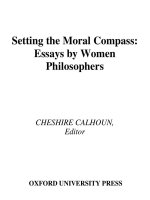- Trang chủ >>
- Khoa Học Tự Nhiên >>
- Vật lý
setting the moral compass essays by women philosophers dec 2003
Bạn đang xem bản rút gọn của tài liệu. Xem và tải ngay bản đầy đủ của tài liệu tại đây (1.97 MB, 399 trang )
Setting the Moral Compass:
Essays by Women
Philosophers
CHESHIRE CALHOUN,
Editor
OXFORD UNIVERSITY PRESS
Setting the Moral Compass
studies in feminist philosophy
Cheshire Calhoun, Series Editor
advisory board
Susan Bordo, University of Kentucky
Harry Brod, Temple University
Claudia Card, University of Wisconsin
Lorraine Code, York University, Toronto
Kimberle Crenshaw, Columbia Law School/UCLA School of Law
Jane Flax, Howard University
Ann Garry, California State University, Los Angeles
Sally Haslanger, Massachusetts Institute of Technology
Hilde Hein, College of the Holy Cross
Alison Jaggar, University of Colorado, Boulder
Helen Longino, University of Minnesota
Maria Lugones, SUNY Binghamton
Uma Narayan, Vassar College
James Sterba, University of Notre Dame
Rosemarie Tong, University of North Carolina, Charlotte
Nancy Tuana, Penn State University
Karen Warren, Macalester College
Iris Marion Young, University of Chicago
published in the series:
Gender in the Mirror: Confounding Imagery
Diana Tietjens Meyers
Autonomy, Gender, Politics
Marilyn Friedman
Abortion and Social Responsibility
Laurie Shrage
Setting the Moral Compass
Edited by Cheshire Calhoun
edited by cheshire calhoun
Setting the Moral Compass
essays by women philosophers
1
2004
3
Oxford New York
Auckland Bangkok Buenos Aires Cape Town Chennai
Dar es Salaam Delhi Hong Kong Istanbul Karachi Kolkata
Kuala Lumpur Madrid Melbourne Mexico City Mumbai Nairobi
Sa
˜
o Paulo Shanghai Taipei Tokyo Toronto
Copyright 2004 by Oxford University Press, Inc.
Published by Oxford University Press Inc.
198 Madison Avenue, New York, New York 10016
www.oup.com
Oxford is a registered trademark of Oxford University Press
All rights reserved. No part of this publication may be reproduced,
stored in a retrieval system, or transmitted, in any form or by any means,
electronic, mechanical, photocopying, recording, or otherwise,
without the prior permission of Oxford University Press.
Library of Congress Cataloging-in-Publication Data
Setting the moral compass : essays by women philosophers / edited by Cheshire Calhoun.
p. cm. — (Studies in feminist philosophy)
Includes bibliographical references and index.
ISBN 0-19-515474-6; ISBN 0-19-515475-4 (pbk.)
1. Ethics.2.Feminist ethics. I. Calhoun, Cheshire. II. Series.
BJ1395.S48 2003
170′.82—dc21 2003048636
987654321
Printed in the United States of America
on acid-free paper
Preface
When I first thought about creating a collection of work in moral philosophy, this
is not the collection I originally imagined. Hilde Lindemann Nelson had sug-
gested to me that I put together an anthology of work in feminist ethics, and my
first thought was to do one in feminist virtue ethics. But as I began the work of
selecting contributors and writing a proposal, I found myself increasingly disinter-
ested in that task. Instead, I began to think about all the women moral philoso-
phers I have read since the early 1980s whom I have admired, been inspired by,
and learned so much from, particularly how to write philosophy that speaks to
ordinary moral experience. I wanted all of these women in one book so that I
could honor (at least some of) the women who have made moral philosophy a
place where women can work. And I wanted to see their work, finally, in one
place because it seemed to me that there was some important way in which they
are kindred philosophical minds. But there was one sizable obstacle to publishing
such a collection: there didn’t seem to be a rationale for bringing the diverse set
of philosophers I had in mind into one collection. There was no obvious principle
of unity. Some of the authors were doing explicitly feminist philosophical work
addressed primarily to other feminist thinkers. Others were squarely engaged in
nonfeminist philosophical conversations with other moral philosophers, most of
whom were men. So this couldn’t be a collection of feminist ethics. But there
was no other obvious thematic unity to call upon because the sorts of moral phi-
losophy they did were quite different. The only alternative was to envision the
book as a kind of festschrift, honoring women who have contributed in important
ways to moral philosophy. But this, too, was an unsatisfactory frame—not because
the contributors didn’t deserve to be honored (surely they do) but because what I
wanted to bring into view was the nonaccidental fact that all of the philosophers
I felt were kindred minds were women. So this, in the end, is the conviction that
unifies this volume: gender makes a difference. The difference it makes is some-
times subtle, often unpredictable, and is compatible with deep philosophical dis-
preface
agreements among women philosophers. But the field of moral philosophy would
not be the same without the women philosophers who helped construct it. It will
be different yet in a future when it is no longer necessary to insist that the differ-
ence women make to moral philosophy is something to be prized.
I owe a debt of gratitude to the moral philosophers whose work appears in
this volume—and to many others whose work does not. This collection is limited
in many ways—to almost exclusively U.S. philosophers, many of whom are mem-
bers of the same generation and all of whom do what might loosely be called
“analytic” philosophy. Readers will probably notice many other limits.
I am grateful to my home institution, Colby College, which has, as always,
provided generous research support and a sabbatical leave. That support enabled
me to work with Jason Beal, a student research assistant, who cut his editing teeth
on this volume. I am deeply thankful for his persistence, collaborative spirit, and
hard work.
vi
Acknowledgments
My thanks to the following publishers for granting permission to reprint essays for
this volume:
Repair by Elizabeth V. Spelman. Copyright 2002 by Elizabeth V. Spelman.
Reprinted by permission of Beacon Press, Boston.
Martha C. Nussbaum, “The Future of Feminist Liberalism.” Proceedings and Ad-
dresses of the American Philosophical Association, vol. 74, no.2(November 2000).
Reprinted with permission of the American Philosophical Association.
Barbara Herman, “The Scope of Moral Requirement.” Philosophy and Public
Affairs, vol. 30, no.3(Summer 2001). Copyright Princeton University Press
2001.
Susan Wolf, “The Moral of Moral Luck.” Philosophic Exchange, no.31(2000–
2001). Reprinted with permission of the Center for Philosophic Exchange.
A substantial portion of the essay “Common Decency,” by Cheshire Calhoun,
originally appeared in “Expecting Common Decency,” Philosophy of Education
2002: A Publication of the Philosophy of Education Society. Copyright held by the
Philosophy of Education Society, reprinted with the society’s permission.
Claudia Card, “Genocide and Social Death.” Hypatia: A Journal of Feminist Phi-
losophy, vol. 18, no.1(2003). Reprinted with permission of Indiana University
Press.
Alison Jaggar, “Globalizing Feminist Ethics.” Hypatia: A Journal of Feminist Phi-
losophy, vol. 13, no.2(1998). Reprinted with permission of Indiana University
Press.
acknowledgments
Michele Moody-Adams, “The Idea of Moral Progress.” Metaphilosophy, vol.30
(July 1999). Reprinted with permission of Blackwell Publishing Ltd.
“The Improvisatory Dramas of Deliberation,” by Amelie Oksenberg Rorty, is a
revised version of “The Improvisatory Drama of Decision-Making,” which origi-
nally appeared in Well-Being and Morality: Essays in Honour of James Griffin, ed.
Roger Crisp. Copyright 2000. Reprinted with permission of Oxford University
Press.
Christine M. Korsgaard, “Self-Constitution in the Ethics of Plato and Kant.” The
Journal of Ethics: An International Philosophical Review, vol.3(1999), pp.1–29.
Copyright 1999 Kluwer Academic Publishers. Reprinted with kind permission
of Christine M. Korsgaard, Harvard University, and Kluwer Academic Publishers.
viii
Contents
Contributors xi
Introduction 3
I An Ethics for Ordinary Life and Vulnerable Persons
1 Virtue and the Skills of Ordinary Life 23
Marcia Homiak
2 The Household as Repair Shop 43
Elizabeth V. Spelman
3 Taking Care: Care as Practice and Value 59
Virginia Held
4 The Future of Feminist Liberalism 72
Martha C. Nussbaum
II What We Ought to Do for Each Other
5 The Scope of Moral Requirement 91
Barbara Herman
6 The Moral of Moral Luck 113
Susan Wolf
7 Common Decency 128
Cheshire Calhoun
III The Normative Importance of a Shared Social World
8 Resentment and Assurance 145
Margaret Urban Walker
contents
9 Genocide and Social Death 161
Claudia Card
10 Demoralization, Trust, and the Virtues 176
Annette C. Baier
IV Achieving Adequate Moral Understandings
11 Kant on Arrogance and Self-Respect 191
Robin S. Dillon
12 Diversity, Trust, and Moral Understanding 217
Marilyn Friedman
13 Globalizing Feminist Ethics 233
Alison M. Jaggar
14 The Idea of Moral Progress 256
Michele Moody-Adams
V The Dramatic and Narrative Form of Deliberation and Agency
15 The Improvisatory Dramas of Deliberation 275
Amelie Oksenberg Rorty
16 Narrative and Moral Life 288
Diana Tietjens Meyers
VI Emotions, Reason, and Unreason
17 Self-Constitution in the Ethics of Plato and Kant 309
Christine M. Korsgaard
18 Emotional Rationality as Practical Rationality 333
Karen Jones
19 Killing in the Heat of Passion 353
Marcia Baron
Index 379
x
Contributors
Annette Baier, retired from the University of Pittsburgh, lives in her birthplace,
Queenstown, New Zealand, with periods of residence also in Dunedin, near the
University of Otago, where she first studied philosophy. She continues to write on
trust, on emotions, and on David Hume’s philosophy. She is a past president of
the Eastern Division of the American Philosophical Association. Her books in-
clude The Commons of the Mind (The Paul Carus Lectures), Moral Prejudices,
and A Progress of Sentiments: Reflections on Hume’s Treatise.
Marcia Baron is professor of philosophy at Indiana University. Her publications
include Kantian Ethics Almost without Apology (1995). “Kantian Ethics and
Claims of Detachment,”inFeminist Interpretations of Immanuel Kant, ed. Robin
Schott (1997) and “‘I Thought She Consented,’” Philosophical Issues. She is cur-
rently working on battered women’s self-defense claims and manipulativeness.
She has served as president of the Central Division of the American Philosophical
Association.
Cheshire Calhoun is Charles A. Dana Professor of Philosophy at Colby College,
Waterville, Maine. She typically works at various intersections of feminist philoso-
phy, ethics, and gay and lesbian studies. She is the author of Feminism, the Fam-
ily, and the Politics of the Closet: Lesbian and Gay Displacement (Oxford Univer-
sity Press, 2000); coeditor of What Is an Emotion?; and has published essays on
forgiveness, integrity, civility, and responsibility.
Claudia Card is Emma Goldman Professor of Philosophy at the University of
Wisconsin, where she has taught since 1966. She has teaching affiliations with
women’s studies, environmental studies, and Jewish studies. Her most recent
books are The Atrocity Paradigm: A Theory of Evil (2002) and The Cambridge
Companion to Beauvoir (2003).
xi
contributors
Robin S. Dillon is associate professor of philosophy at Lehigh University, where
she also served as director of Women’s Studies for six years. She has published
articles on self-respect and respect, including “Self-Respect: Moral Emotional,
Political,” Ethics 107 (1997) and “Self-Forgiveness and Self-Respect,” Ethics 112
(2001), and is the editor of Dignity, Character and Self-Respect (1995).
Marilyn Friedman teaches philosophy at Washington University in St. Louis. Her
research falls into the areas of political philosophy, ethics, and feminist thought.
She is the author of Autonomy, Gender, Politics (Oxford University Press, 2003)
and What Are Friends For? Feminist Perspectives on Personal Relationships and
Moral Theory; (1995), the coauthor of Political Correctness: For and Against; and
the coeditor of Rights and Reason: Essays in Honor of Carl Wellman (2000), Mind
and Morals: Essays on Ethics and Cognitive Science, and Feminism and Commu-
nity (1995).
Virginia Held is Distinguished Professor of Philosophy at the City University of
New York Graduate School. Among her books are The Public Interest and Individ-
ual Interests (1970); Rights and Goods: Justifying Social Action (1984); Feminist
Morality: Transforming Culture, Society, and Politics (1993); and the edited collec-
tions Property, Profits, and Economic Justice (1980) and Justice and Care: Essential
Readings in Feminist Ethics (1995). She has served as president of the Eastern
Division of the American Philosophical Association, been a fellow at the Center
for Advanced Study in the Behavioral Sciences, and has had Fulbright and Rocke-
feller fellowships. She is currently working on a number of essays on the ethics of
care and the challenge this kind of theory presents to standard moral theories.
Barbara Herman is Griffin Professor of Philosophy at the University of California,
Los Angeles, and a past president of the Pacific Division of the American Philo-
sophical Association. She is the author of The Practice of Moral Judgment (1996),
as well as articles on Kant’s ethics, issues of moral development and literacy, and
the social conditions for empirical autonomy. She is currently working on the
topic of moral improvisation.
Marcia Homiak is professor of philosophy at Occidental College, where she
teaches philosophy, women’s studies, and ancient history. Her published papers
are on topics in classical ethics, the history of ethics, moral psychology, and femi-
nist ethics. She is currently writing a book on character and virtue that seeks to
show the contemporary relevance of Aristotle’s discussions of these topics.
Alison M. Jaggar is professor of philosophy and women’s studies at the University
of Colorado at Boulder. Her books include Feminist Politics and Human Nature
(1983); Living with Contradictions: Controversies in Feminist Ethics (1994); and
The Blackwell Companion to Feminist Philosophy, coedited with Iris M. Young
(1998). Currently, she is working on a book on moral justification. Alison Jaggar
was a founding member of the Society for Women in Philosophy, a past chair of
xii
contributors xiii
the American Philosophical Association Committee on the Status of Women, and
now works with a number of feminist organizations.
Karen Jones is lecturer in philosophy at the University of Melbourne. She has
held positions at Cornell University and at the Research School of Social Sci-
ences, the Australian National University. She has written extensively on trust in
both its epistemic and ethical dimensions.
Christine M. Korsgaard is Arthur Kingsley Porter Professor of Philosophy at Har-
vard University. Her primary interests are in moral philosophy and its history and
the theory of practical reason. She is the author of Creating the Kingdom of Ends,
a collection of essays on Kant’s moral philosophy, and The Sources of Normativity,
an expanded version of her 1992 Tanner Lectures on the grounds of obligation.
In Self-Constitution, her forthcoming Locke Lectures, she explores connections
among ethics, the theory of action, and personal identity.
Diana Tietjens Meyers is professor of philosophy at the University of Connecti-
cut, Storrs. Her most recent monographs are Self, Society, and Personal Choice;
Subjection and Subjectivity: Psychoanalytic Feminism and Moral Philosophy; and
Gender in the Mirror: Cultural Imagery and Women’s Agency (Oxford University
Press, 2002); her most recent edited collections are Feminists Rethink the Self and
Feminist Social Thought: A Reader. She is the author of the forthcoming Encyclo-
pedia Britannica entry on Philosophical Feminism.
Michele Moody-Adams is currently director and Hutchinson Professor of Ethics
and Public Life and professor of philosophy at Cornell University. She does re-
search and teaching on a variety of issues in ethical theory, practical ethics, politi-
cal philosophy, and the philosophy of law. She is the author of Fieldwork in Famil-
iar Places: Morality, Culture and Philosophy (1997) and has published on such
topics as moral relativism and moral objectivity, problems of economic and social
justice, affirmative action and multiculturalism, feminism and equality, and the
moral implications of reproductive technologies.
Martha C. Nussbaum is Ernst Freund Distinguished Service Professor of Law
and Ethics at the University of Chicago, appointed in the Philosophy Department,
Law School, and Divinity School. Her most recent books are Women and Human
Development: The Capabilities Approach (2000), and Upheavals of Thought: The
Intelligence of Emotions (2001). In 2002–2003, she gave the Tanner Lectures in
Canberra, Australia, and Clare Hall, Cambridge, England, on “Beyond the Social
Contract: Toward Global Justice.”
Amelie Rorty is the director of the Program in the History of Ideas at Brandeis and
Orick Visiting Professor at Yale University. Besides numerous essays on Descartes,
Hume, Spinoza, and the history of moral psychology, she has edited anthologies
contributors
on Aristotle, the emotions, self-deception, and most recently Philosophers on Edu-
cation, The Many Faces of Evil, The Many Faces of Philosophy.
Elizabeth V. Spelman is professor of philosophy and the Barbara Richmond 1940
Professor in the Humanities at Smith College. She is author of Inessential
Woman: Problems of Exclusion in Feminist Thought; Fruits of Sorrow: Framing
Our Attention to Suffering; and Repair: The Impulse to Restore in a Fragile World.
Margaret Urban Walker is Lincoln Professor of Ethics, Justice, and the Public
Sphere in the School of Justice Studies at Arizona State University. Author of
Moral Understandings (1998) and Moral Contexts (2003), she writes on moral
epistemology, psychology, and responsibility. She is finishing a book on moral
repair, the moral psychology and social practice of responding to wrongdoing.
Susan Wolf is the Edna J. Koury Professor of Philosophy at the University of
North Carolina at Chapel Hill. She is the author of Freedom Within Reason (Ox-
ford University Press, 1990), a book on free will and moral responsibility, and
numerous articles on ethics and the philosophy of mind. Her current research
focuses on the relations among happiness, morality, and meaningfulness in life.
xiv
Setting the Moral Compass
This page intentionally left blank
Introduction
Cheshire Calhoun
This collection brings together nineteen of the leading women philosophers in
ethics who have contributed to setting the compass in moral philosophy over the
past two or three decades. The result is a set of essays that collectively display
the sorts of powerful and innovative contributions to ethics that women moral
philosophers have made and continue to make. It is a collection that makes visible
women moral philosophers’ varied conceptions of the proper subjects, texts, meth-
ods, audiences, and purposes of moral philosophy. It also invites the reader to
rethink the boundaries between nonfeminist and feminist moral philosophy.
Over the past twenty-five years, the work of women philosophers has reshaped
the field of moral philosophy. The most obvious difference that they have made
is in the development of explicitly feminist moral perspectives. With very few
exceptions, it has been women moral philosophers who have labored to produce
conceptual, theoretical, and interpretive tools that make possible philosophical
analyses of moral phenomena that are integrally connected with gender and other
social hierarchies of power. For some, this has meant developing an alternative to
Kantian, utilitarian, virtue ethical, and liberal political approaches—for example,
an ethic of care or an ethic centered on trust rather than duty. For others, it has
meant employing the resources of Kantian, utilitarian, and virtue ethical frame-
works to address moral concerns that are most salient to persons subordinated
within social hierarchies.
It would be a mistake, however, to think that women’s sole—or even pri-
mary—impact on moral philosophy has been the production of an explicitly femi-
nist ethics. Many women moral philosophers working within nonfeminist com-
munities of scholars, for example, communities of Kantian or Aristotelian moral
philosophers, have introduced distinctive perspectives to and made distinctive de-
mands on moral philosophy. Those perspectives and demands are often continu-
ous with those of women writing explicitly feminist ethics. It is also important to
3
setting the moral compass
keep in mind that many women moral philosophers work within both feminist
and nonfeminist intellectual communities.
Women, of course, cannot claim sole credit for the shifts in moral philosophy
over the past twenty-five years. The discipline of philosophy as a whole has under-
gone substantial pluralization as a result of pressure from a variety of sources.
Nevertheless women moral philosophers are owed much of the credit for the fact
that the range of topics that are now taken to be legitimate in moral philosophy
is much larger than it was in the 1970s. Women philosophers also deserve most
of the credit for the fact that the politics of theory construction—whose interests
do moral theories serve and not serve?—can now be part of the self-reflective
business of moral philosophy. Women philosophers also deserve a sizable portion
of the credit for making the use of multidisciplinary resources a component of
properly done moral philosophy.
Inventive Realism
If there is any one description that captures the common character of women
philosophers’ work in moral philosophy, it is an inventive realism about moral life.
By “realism” I mean attentiveness to what moral life is really like—to what moral
agents are really like, to what the production and acquisition of moral knowledge
is really like, to what the social practice of morality is really like, to what character
development is really like, to what practical decision making is really like—as
opposed to the conventions employed within moral philosophy for describing
these same things. This is not to say that men moral philosophers are inattentive
to moral truths. But it is to say that, as “outsiders-within” the profession of philoso-
phy, women have typically been better positioned both to notice and to take up
in their work moral phenomena that conventionally gets set aside.
1
Women moral
philosophers, as a group, have been more willing to acknowledge and incorporate
into their philosophical accounts the messiness, indeterminacy, and lucky and
unlucky contingencies of moral life. That theme certainly is much in evidence
in this collection. As a group, women moral philosophers have also had less pa-
tience with overly hypothetical or dramatic examples (e.g., the many drown-
ing baby stories) and with idealized, hyperrational models of moral agents; in-
stead, they have been insistent that moral philosophy directly addresses the actual
processes, problems, and experiences of everyday moral life. Two features of
everyday moral life have been particularly salient in women’s moral philoso-
phy and are also particularly salient in this volume: our vulnerabilities and de-
pendencies on each other and the sociopolitical context in which moral life is
conducted.
By “inventiveness” I mean a willingness to be imaginative about the possibili-
ties for work in moral philosophy. That inventiveness emerges from a willingness
to ask: What has moral philosophy not talked about, or said very little about, that
might nevertheless be central to understanding human moral life? What distorted
4
introduction 5
understandings of moral phenomena have become entrenched in disciplinary
knowledge? What new concepts need naming and analyzing within moral philos-
ophy?
Women moral philosophers have exercised their inventive realism in extend-
ing the possibilities for not only what the subjects of moral philosophy are but also
who those subjects are. Women moral philosophers have explored a great variety of
ways of thinking about moral agents other than primarily as rational beings. In this
volume, for example, moral agents are described as homo reparans (the repairing
animal), participants in improvisatory dramas, self-narrating subjects, trusting or
distrusting responders to human mutual vulnerability, self-constituting unities of
reason and emotion, needy animals, beings who require social vitality, and selves
that cannot be detached from their unintended causal effects on others.
By “inventiveness” I also mean a willingness to be imaginative about the
possible textual resources for and styles of philosophical writing. Women moral
philosophers have not always assumed that moral philosophy must be addressed
to academic moral philosophers. Part of being accountable to everyday life is
writing moral philosophy that is accountable to the plurality of contexts in which
moral philosophizing might be needed. Women moral philosophers have also not
assumed that the best textual resources are necessarily academic philosophical
ones. In addition to disciplinary resources, they have drawn on a wide array of
literature in women’s studies, psychology, psychoanalytic theory, sociology, literary
theory, literature, and social and cultural history, as well as etiquette manuals and
other popular texts.
That women moral philosophers have brought such originality to their work
might be explained in a number of ways. First, both human activities and human
cognitive and emotional capacities are gender-coded. The socialization and edu-
cation of children, most of human emotionality, and the maintenance of many
personal and communal relationships are coded feminine. By comparison to mas-
culine-coded activities and capacities (e.g., combat, competitive games, the mak-
ing of contractual agreements, rational decision making, and the pursuit of indi-
vidual preferences), such feminine-coded activities and capacities have largely
been ignored in moral philosophy. Part of what women moral philosophers have
brought to the discipline is a firm sense of what those neglected activities and
capacities are, as well as a vision of how moral philosophy might be improved by
greater attentiveness to the full complexity of human life.
Second, although the number of women philosophers has increased over
time, women remain significantly underrepresented in the discipline. Regardless
of how prominent and well respected some women philosophers have become,
the relative dearth of women in philosophy, particularly at more advanced levels
and in the most prestigious institutions, means that women philosophers are al-
ways marked by their difference. Being already marked as different may make it
more natural for women to pursue unconventional avenues in philosophy.
Finally, women philosophers, because they are members of a socially dis-
esteemed gender, have often wanted something different and more from moral
setting the moral compass
philosophy, namely, a moral philosophy that is politically responsible. This means,
in part, that in its assumptions and theoretical accounts moral philosophy should
not encode gender biases. In part, a politically responsible moral philosophy is
one that acknowledges and is equipped to address a variety of systems of institu-
tionalized oppression. And in part, a politically responsible moral philosophy at-
tends to the interconnections between the social conditions under which people
live and the possibilities for moral agency and knowledge.
Some of the most interesting and original work produced by women phi-
losophers has centered around the production of richer and more complex de-
pictions of the persons who are the agents and patients of moral action. That
rich depiction has included much more careful attention to the development
of moral character from childhood through adulthood and to the interpersonal,
social, and political influences on character formation and moral deliberation.
Women moral philosophers with feminist sensibilities have consistently chal-
lenged the tendency in much moral philosophy to begin theorizing, either implic-
itly or explicitly, from a picture of moral persons as fully formed adults, who
are not located in inegalitarian societies, who do not experience long periods of
dependency on others, whose moral life is not hedged with contingencies, whose
pleasures and passions are not constitutive elements of their moral life, and for
whom reason giving is unaffected by the narratives we tell of our lives or by the
dynamics of social interaction. All of the essays in this volume illustrate that chal-
lenge.
Women moral philosophers have also been more inclined to abandon some
familiar ways of thinking about moral character—that character is something that,
once formed, is relatively static; that autonomy is the overshadowingly important
moral competency; and that our conceptions of virtues and vices are not interest-
ingly linked to social conceptions of gender. They have raised questions about
what role moral education, family life, cultural gender imagery, the distribution
of social resources, socially shared moral understandings, and the dynamics of
social interaction play in producing morally competent (or incompetent) adults
and in enabling (or disabling) individual moral progress. They have been mindful
of the fact that the selves who are open to character revision and new moral
understandings are always already located in a social world in which power in-
equalities are variously institutionalized. This fact raises important questions about
how we should conceptualize the relation between the possibility of moral prog-
ress on the part of individuals and the possibility of moral and political progress
at the social level.
The rich depiction of persons has also included much more careful attention
to the complexity of moral psychology. Not starting from a picture of persons as
ideally rational, deliberative agents has, among other things, enabled women
moral philosophers to attend more carefully to questions about the role that emo-
tions play in human moral life. In working out depictions of human moral psy-
chology, women moral philosophers have been less attracted both to internal
“combat” models—for example, those that pit reason against emotion or concern
6
introduction 7
for others against concern for self—and to overly unified conceptions of the self
that exclude multiplicity within the self.
Although only some women moral philosophers locate their work in the tradi-
tion of virtue ethics extending from Aristotle, many have nevertheless found analy-
sis of particular virtues and vices to be central to a rich and complex account of
persons. Investigation of virtue and vice naturally lends itself to the pursuit of
questions about luck, about the social context of morality, and about morally
important perceptual and emotional sensitivities. Among those character traits that
have seemed particularly important to examine in inegalitarian societies are trust,
self-respect, arrogance, and integrity.
Work by women philosophers has also helped to enlarge our philosophical
vision of moral injury. For a complex set of reasons, including their experience
of institutionalized sexism, women moral philosophers have been less inclined to
focus narrowly on wrongdoing that is clearly attributable to particular individuals.
When complex social arrangements and interactions are implicated in the pro-
duction of moral injuries, it may be very difficult to assign individual responsibil-
ity, to mete out adequate punishment, and to focus reactive attitudes of indigna-
tion, resentment, and forgiveness on clearly defined targets. Even when individual
responsibility is clear, retributive responses may be morally less important than
acts and attitudes that aim at repairing broken moral relationships or reaffirming
shared norms. In other cases the moral injuries are so horrific they exceed our
everyday conception of moral wrongdoing and are evils for which no retributive
response seems adequate. Cases in which the amount or scope of injury is exces-
sive invite reflection on the nature of evil, the appropriateness of forgiveness, and
the options for morally restorative responses.
The boundary between moral and political philosophy is not a sharp one and
is especially blurred in the work of women moral philosophers. That is partly
because attention to the institutions, practices, and ideologies that sustain gender
inequality so often figures in their moral philosophy. Are there, for example, per-
spectives whose social availability should not be tolerated in the name of diversity
because they are dangerous to moral development? In real-life moral discourses
that aim to generate principles agreeable to all, should already socially dominant
voices be muted? And given our very different social locations, who is positioned
to morally criticize whose practices?
The blurring of the boundaries between the moral and the political has also
resulted in part from the fact that women moral philosophers have more often
included within the scope of political philosophy an attention to the justice of
familial arrangements and the current distribution of care-giving work. Because
women make up the majority of care givers, especially for the most needy and
dependent humans at both ends of the life span, women moral philosophers have
been more inclined to raise both moral and political questions about care giving.
How central are caring practices to the practice of morality? How would liberal
political philosophy need to be rethought in order to adequately address the cen-
trality of care giving and care receiving to human lives?
setting the moral compass
“Woman Philosopher”?
This is a book by women moral philosophers. It is the authors’ social location—be-
ing gendered “woman” in moral philosophy—that is central to the organization
and philosophical aims of this text. It is important to be clear what this does not
mean. Although I do think it is both legitimate and important to attend to the
differences that gender makes to the production of moral philosophy (differences
like the ones described above), women do not produce a “women’s moral philoso-
phy.” The persistence of gender essentialism in cultural thought about women
and men makes it tempting to overread the difference that gender makes. Gender
essentialism is the view that all women, in virtue of being women, share a com-
mon gendered subjectivity. Those commonalities are assumed to be so pervasive
that producing philosophy as women will result in a more or less univocal style
and content of theorizing that clearly contrasts with whatever univocal style and
content of theorizing men produce when they do philosophy as men. Feminists
have by now subjected gender essentialism to extensive critique. They have ar-
gued that women’s subjectivities are multiply and complexly affected by their
gendered and other social identities, as well as by their personal histories and
autonomous choices. Thus, that gender makes a difference to the production of
philosophy does not mean that women’s philosophical work elaborates a theoreti-
cally unified field, with its own set of key concepts and fundamental principles,
that might then be opposed to, say, Kantian ethics or utilitarian ethics. Unfortu-
nately, this has been how “feminist ethics” has often been misread. Especially in
introductory textbooks, feminist ethics is often equated with some version of care
ethics. This is simply a mistake. Feminist ethics comprises a complex and theoreti-
cally disunified body of work. The institutionalization of a distinct subfield of
philosophy—feminist ethics or, more generally, feminist philosophy—emerged
not from the theoretical unity of this work but from a political need. The point
of having a distinct category of philosophy called feminist ethics or feminist phi-
losophy is to promote the development of conceptual, theoretical, and interpretive
tools that will enable philosophy to be responsive to the fact that gender and other
hierarchies of power have important and damaging effects on human personal,
social, and cognitive life.
In this collection, the point of using the categories woman philosopher and
work by women philosophers is similarly political. I will argue, shortly, that reading
women moral philosophers’ work in relation to each other—rather than, say, in
relation to fellow Kantians or fellow feminist philosophers—does important cogni-
tive and practical work for the discipline of philosophy.
2
As I will explain below,
the collection is intended to provide what I think is a much needed intervention
in how we, philosophers, think about the relation between gender and philosophy;
how we think about women’s relation to both feminist and “mainstream” philoso-
phy; and how we conventionally allow—or don’t allow—women’s difference to
appear. Before doing so, some cautionary remarks about using the category woman
philosopher are in order.
8
introduction 9
Presenting the work of stellar moral philosophers under the title of Essays by
Women Philosophers is multiply problematic. To be invited to contribute to a
collection devoted to work by women moral philosophers is, as Annette Baier
observed, a dubious honor. “No one dreams,” she wrote me, “of an anthology
documenting men’s contributions to recent philosophical ethics.” It is as individu-
als with something of their own to say that men contribute to philosophy, not as
examples of philosophical manhood. Toril Moi develops a similar point in her
recent collection, What Is a Woman?
In certain situations, I wish my female body to be considered as the
insignificant background of my claims or acts. This is not the same thing
as to say that I wish my body to disappear or to be transformed into a
male body. My wish does not represent an attempt to escape my particu-
larity, to be considered as a neuter, or as some kind of universalized
human being. It represents, rather, a wish to deny that the fact of being
a woman is of any particular relevance to my understanding of trigonom-
etry or my capacity to compose symphonies or think ethically.
3
In saying that the fact of her being a woman is not of any particular relevance
to her capacity to think ethically, Moi is not in fact claiming that gender makes
no difference to how one thinks. On the contrary, Moi denies that were she a
man she would think or write exactly the same things: “I probably do read Kant
or Kierkegaard,” she says, “in ways I would not have done had I been a man.”
4
In
a society in which gender makes many differences to our lives, one’s embodiment
as a man or a woman is likely to make at least some difference to one’s philosophi-
cal thinking. In what sense, then, is Moi’s being gendered “woman” irrelevant to
her capacity to think ethically? It is irrelevant in exactly the same sense that men’s
gender is irrelevant to their capacity to think ethically. Moi observes that when
gender makes a difference to the way that men think, men are not obliged to
signify the difference that gender makes by presenting their work as that of a male
philosopher. It is a mark of sexism that whenever women’s embodiment is thought
to make some (even slight) difference to their philosophical thinking they are
obliged to present their work as the product of a woman philosopher. In short,
what both Baier and Moi make perspicuous is the fact that the term woman philos-
opher is part of a sexist politics of knowledge. That sexist politics of knowledge
consists of regarding the effects of male embodiment on philosophical thought as
unworthy of note because “philosopher” is implicitly equated with “being embod-
ied male.” That sexist politics of knowledge also consists of regarding the effects
of female embodiment on philosophical thought as noteworthy because it is a
deviation from the norm.
To create a collection devoted to work by women moral philosophers is, thus,
to run the risk of implicating the contributors in this pattern of noting the effects
of embodiment on philosophical thought only in the case of women and never
for men. It thus risks perpetuating the very style of thinking that sustains gender
inequality in the discipline.
setting the moral compass
There are other problems, too, with thematizing the gendered location of the
contributors to this volume. In a discipline that is now often self-conscious about
the sadly low numbers of women in philosophy and its long history of not honor-
ing even the most deserving women philosophers, taking women’s gender into
account is often part of corrective practices, ranging from affirmative action to
making special efforts to award to women various honors. The existence of correc-
tive practices, however, gives women who receive awards—from jobs to American
Philosophical Association presidencies—reason to wonder just what this award
means. Does it mean that their talents have in fact been recognized and justly
rewarded? Or does it mean that they are the token woman in a corrective practice
(without which they would have received nothing)?
To create a collection devoted to work by women moral philosophers is, thus,
to risk suggesting that they are being honored not because they are truly worthy
of philosophical honor but because there has been too little honoring of women
in philosophy.
Given these serious disadvantages to employing the category “woman phi-
losopher,” there had better be some strongly compelling, counterbalancing justi-
fication for constructing a collection that emphasizes that very category. I think
there is.
In explicating Beauvoir, Toril Moi points out, “We are continuously making
something of what the world makes of us.”
5
Those who are embodied as women
inevitably must make something of the fact that our social worlds make all sorts
of things of our evident sex differences. And when those embodied as women
come to philosophy, they must also make something of what their academic envi-
ronments make of them. Women academics enter a world in which they consti-
tute 36% of full-time faculty across institutions and only 25% in research universi-
ties.
6
Women philosophers enter a world in which their numbers are dramatically
lower. It is a world in which they will inevitably be implicated in affirmative
action debates (as hires, as advocates, and as members of the underrepresented
group); that offers an array of opportunities for reflection on and resistance to
sexism in the academy (such as women’s studies programs, the Society for Women
in Philosophy, and the American Philosophical Association’s Committee on the
Status of Women); that often presumes that any woman will represent “women’s
point of view”; that too often provides a basis for complaint (both on one’s own
behalf and on behalf of other women) about hiring, evaluation, tenure, curricu-
lum construction, judgments about what doesn’t count as real philosophy, and
the distribution of resources, awards, and work (especially service work). Given
the pervasive difference that gender makes to how we are received, spoken to,
supported, and acknowledged, as well as to what we are expected to do or not to
do, it would be remarkable indeed if gender made no difference to one’s subjectiv-
ity. It would be equally remarkable if the ways in which women philosophers
make something of what the world makes of us left no traces in our philosophical
production. That there would be traces seems particularly likely among women
philosophers who have well-formed feminist sensibilities and are attuned to the
cultural difference that gender makes. It also seems particularly likely among
10









